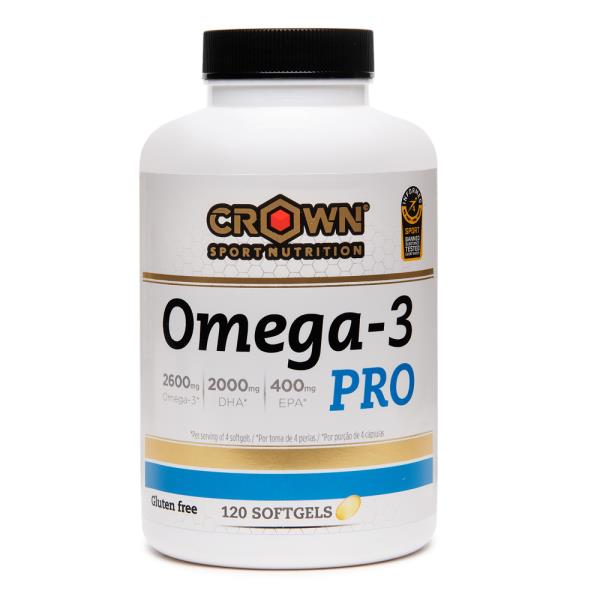Suplementación con omega-3: ¿Cuáles son sus beneficios?

Los ácidos grasos omega-3 son una familia de ácidos grasos esenciales poliinsaturados (PUFA), que se dividen en tres tipos fundamentalmente: ácido alfa-linolénico (ALA); ácido eicosapentaenoico (EPA); y ácido docosahexaenoico (DHA). El ALA se encuentra en frutos secos, semillas y aceites de semillas (p.ej. lino o chía), mientras que el EPA y DHA se encuentra en pescados azules, crustáceos y algas. Además, la suplementación con aceites de pescados (ricos en omega-3 y especialmente en DHA), surge como una potencial herramienta para maximizar los efectos fisiológicos de estos ácidos grasos.
¿Cuáles son los beneficios de la suplementación con omega-3 a nivel de salud?
Los beneficios para la salud derivan fundamentalmente de las acciones antiinflamatorias y antioxidantes de sus mediadores lipídicos(1). Por ello, la suplementación con omega-3 podría ser efectiva frente al manejo y tratamiento de distintas enfermedades inflamatorias o autoinmunes (p.ej. artritis reumatoide, enfermedad de Crohn, psoriasis, lupus eritrematoso o esclerosis múltiple o tiroiditis autoinmune entre otras) (2,3), enfermedades metabólicas (p.ej. diabetes) y cardiovasculares(4, 5). Además, la suplementación con omega-3 es útil frente a enfermedades neurodegenerativas, reduciendo la neuroinflamación y el declive cognitivo relacionado con la edad(6.) Específicamente la suplementación con elevadas cantidades de DHA presenta efectos positivos en cuanto al mantenimiento normal de la estructura cerebral6, menor neurodegeneración(7) y mejora en la función cognitiva(8).

¿Y que beneficios podría tener en deportistas de resistencia?
No debemos obviar el propio hecho de que la suplementación con omega-3 podría mejorar todos los parámetros de salud anteriormente mencionados en atletas (p.ej. cardiovascular, inflamación, cognición, etc.). Pero sus beneficios en situaciones de alto rendimiento va mucho más allá. Especificamente, el entrenamiento de resistencia altera los niveles musculares de omega-3 (9), por ello los requerimientos dietéticos en estos atletas podrían ser mayores(10).
La suplementación con omega-3 podría ayudar en la recuperación muscular(10), disminuyendo el daño muscular inducido por el ejercicio(11), especialmente en ejercicios de alta intensidad y larga duración. Esta mejora se debe a: 1) una disminución en la inflamación; 2) una mejor respuesta immune(10); y 3) un menor daño celular (p.ej. peroxidación lipídica o estrés oxidativo)(10). Específicamente, la suplementación con omega-3 ha mostrado mejorar variables relacionadas con la recuperación (p.ej. inflamación, estrés oxdiativo, daño muscular, etc) en atletas de resistencia(12).
Por otra parte, la suplementación con omega-3 desencadena una mejor respuesta vasodilatadora y cardiovascular tras el ejercicio (p.ej. mejorando la respuesta del óxido nítrico) (10), con un efecto positivo en las adaptaciones fisiológicas especialmente al entrenamiento de resistencia.
Además, la suplementación de omega-3 (con cantidades adecuadas de DHA) podría potenciar el sistema immune (debido a la producción de distintos mediadores lipídicos), reduciendo el riesgo de enfermedades y lesiones en atletas (12). Siendo esto esencial ya que el sistema immune se debilita en disciplinas de resistencia, debido al gran volumen de entrenamiento.
Por último, los suplementos de omega-3 con niveles óptimos de DHA mejoran la cognición, la memoria, el estado anímico y el tiempo de reacción en atletas(10). Por ello, sabiendo la importancia que tiene la concentración en el rendimiento, especialmente en disciplinas de larga duración (p.ej. disciplinas aeróbicas), el uso de estos suplementos podría ser de gran utilidad.
Conclusión
En definitiva, una suplementación con omega-3 podría tener efectos beneficiosos tanto a nivel de salud como de rendimiento.
NUEVO OMEGA-3 PRO DE CROWN SPORT NUTRITION
Crown Sport Nutrition lanza el primero de sus productos de la línea de salud para deportistas, el Omega-3 PRO:
- Perlas de aceite de pescado con 2600 mg de Omega-3 en forma TG, por porción de 4 perlas.
- 2000 mg de DHA y 400 mg de EPA
- Materia prima de alta calidad Solutex®, con ausencia de metales pesados, mínimo sabor y reflujo a pescado.
- Con certificado antidoping Informed Sport
- Formato bote 120 softgels a 29,95€ PVP

LA MARCA
Crown Sport Nutrition es una marca española especialista en alto rendimiento. Primera empresa española con certificación antidoping Informed-Sport, han realizado numerosos estudios científicos con varios artículos publicados en JCR Q1 y Q2 que avalan varios de sus productos y su filosofía.
Cuentan con formulaciones basadas en la ciencia, materias primas y fabricación de alta calidad. Colaboran con universidades e instituciones internacionales como la U. Greenwich, la UFV y la ESSNA y también con atletas, equipos y federaciones de primer nivel internacional. Actualmente están expandiéndose internacionalmente en mercados europeos, Oriente Medio y Latinoamérica.
Referencias:
1-Ostermann, A. I. et al. Plasma oxylipins respond in a linear dose-response manner with increased intake of EPA and DHA: Results from a randomized controlled trial in healthy humans. American Journal of Clinical Nutrition 109, 1251–1263 (2019).
2-Hahn, J. et al. Vitamin D and marine omega 3 fatty acid supplementation and incident autoimmune disease: VITAL randomized controlled trial. Bmj 376, (2022).
3-Simopoulos, A. P. Omega-3 fatty acids in inflammation and autoimmune diseases. J Am Coll Nutr 21, 495–505 (2002).
4-Djuricic, I. & Calder, P. C. Polyunsaturated fatty acids and metabolic health: novel insights. Current Opinion in Clinical Nutrition and Metabolic Care vol. 25 436–442 (2022).
5-Hu, Y., Hu, F. B. & Manson, J. E. Marine omega-3 supplementation and cardiovascular disease: an updated meta-analysis of 13 randomized controlled trials involving 127 477 participants. J Am Heart Assoc 8, e013543 (2019).
6-Devassy, J. G., Leng, S., Gabbs, M., Monirujjaman, M. & Aukema, H. M. Omega-3 polyunsaturated fatty acids and oxylipins in neuroinflammation and management of Alzheimer disease. Advances in Nutrition vol. 7 905–916 (2016).
7-Sala-Vila, A. et al. DHA intake relates to better cerebrovascular and neurodegeneration neuroimaging phenotypes in middle-aged adults at increased genetic risk of Alzheimer disease. Am J Clin Nutr 113, 1627–1635 (2021).
8-Swanson, D., Block, R. & Mousa, S. A. Omega-3 fatty acids EPA and DHA: health benefits throughout life. Advances in nutrition 3, 1–7 (2012).
9-Helge, J. W. et al. Training affects muscle phospholipid fatty acid composition in humans. (2001).
10-Lewis, N. A., Daniels, D., Calder, P. C., Castell, L. M. & Pedlar, C. R. Are there benefits from the use of fish oil supplements in athletes? A systematic review. Advances in Nutrition 11, 1300–1314 (2020).
11-Lopez-Seoane, J., Martinez-Ferran, M., Romero-Morales, C. & Pareja-Galeano, H. N-3 PUFA as an ergogenic supplement modulating muscle hypertrophy and strength: a systematic review. Crit Rev Food Sci Nutr 62, 9000–9020 (2022).
12-Thielecke, F. & Blannin, A. Omega-3 fatty acids for sport performance—are they equally beneficial for athletes and amateurs? A narrative review. Nutrients vol. 12 1–28
REVISTAS

Noticias sobre marcas y empresas de deporte

